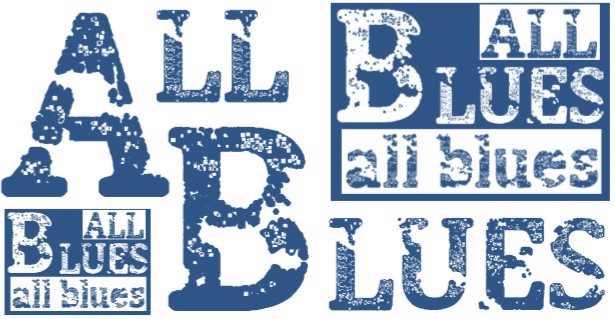| Accueil/Home | Radio Blues Intense | Sweet Home RBA! | All Blues | Dixie Rock | Carrefour du Blues | Interviews | Liens/Links | Contact | Powerblues |
Russell Gulley
Jackson Highway
Interview by Luc Brunot.
Original version of the interview published in Bands Of Dixie #53 (November - December 2006)

Who remembers Jackson Highway? Yet, this Alabama band, a kind of cross between Blackfoot and Wet Willie, had released a very good album in 1980. We met Russell Gulley so that he introduces us more to this too much unknown band. In this interview, he talks us about his career, the two jackson Highway's discs, the legendary producer Jimmy Johnson, Blackfoot, Johnny Neel, Chris Anderson and other artists but also of his new disc
Hello Russell,
You were born in Georgia in 1947 but raised in Alabama. How was the musical life in Alabama during your youth?
You were born in Georgia in 1947 but raised in Alabama. How was the musical life in Alabama during your youth?
I was raised in a Pentecostal Church where music was a big part of our worship services. I sang in the choir and as a teenager began to perform with a Southern Country/Gospel group called The Howell Family. We performed at churches, schools etc. all over the Southeastern USA. I recorded two LPs (the old days of wax records) with the group for the Nugget Records label out of Nashville (owned by Grand Ol' Opry stars, Lonzo and Oscar.)
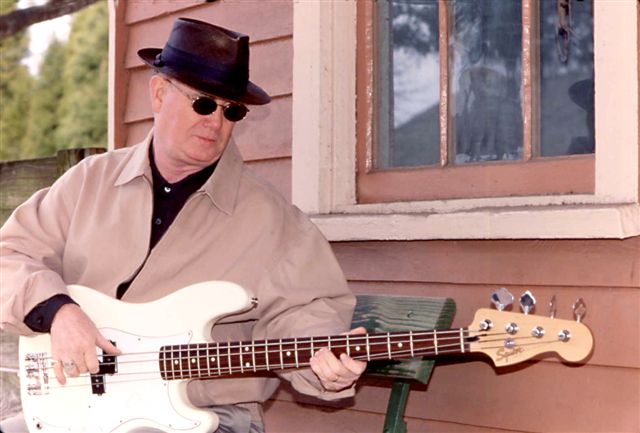 Also as a kid, I was aware of traditional country music, too. My brother, Bobby Stanley (my mother's son by her first marriage), played steel guitar, as taught by his father, "Little" Joe Stanley. Mr. Stanley was a local steel player who worked as a sideman for Hank Williams and others for a while.
Also as a kid, I was aware of traditional country music, too. My brother, Bobby Stanley (my mother's son by her first marriage), played steel guitar, as taught by his father, "Little" Joe Stanley. Mr. Stanley was a local steel player who worked as a sideman for Hank Williams and others for a while.
My blues influences came from early Rock and Roll on radio and television. I was aware of Sun Records and the fact that Elvis and other artists on that label were covering blues songs. I'd also listen to WLAC radio out of Nashville. Their blues shows aired late nights and the reception was really good on my Dad's car radio.
The blues artists that hit me first were Jimmy Reed, Freddy King, and other black artists that were being played on rock and roll radio shows. Later I got into "soul" music in the sixties and the Muscle Shoals soul and swamp stuff. Artists such as Tony Joe White, who were white but played an earthy "funky" style of music, were what I thought of when I thought of Muscle Shoals in those days. Later, I went deeper into the Delta stuff like Howlin' Wolf and Muddy Waters.

My blues influences came from early Rock and Roll on radio and television. I was aware of Sun Records and the fact that Elvis and other artists on that label were covering blues songs. I'd also listen to WLAC radio out of Nashville. Their blues shows aired late nights and the reception was really good on my Dad's car radio.
The blues artists that hit me first were Jimmy Reed, Freddy King, and other black artists that were being played on rock and roll radio shows. Later I got into "soul" music in the sixties and the Muscle Shoals soul and swamp stuff. Artists such as Tony Joe White, who were white but played an earthy "funky" style of music, were what I thought of when I thought of Muscle Shoals in those days. Later, I went deeper into the Delta stuff like Howlin' Wolf and Muddy Waters.
Is your brother Dennis younger? Older?
Dennis is younger in years but often more mature musically. He has always been a big part of anything I do.
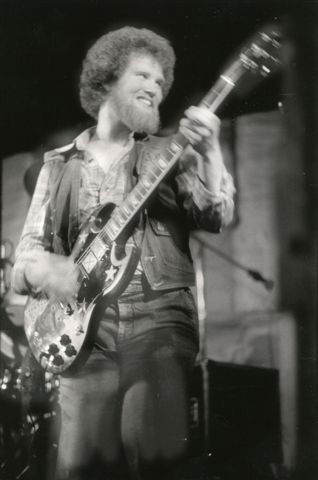
How did you begin to play music?
I started playing bass in church for the choir, then with several garage bands around my home town. We played local teen dances and "battle of the bands" shows at a local theatre. Those shows often feature the guys that later became the country super group, Alabama.
My older (half) brother Bobby, would teach me chords and such but mostly, Dennis and I taught each other and practiced songs in our bedroom. That led later to writing songs together.
Dennis was always good at "copying" a lick or riff from listening to records. He became more technical and precise, while I'm more of just a "feel" player. If it "feels good" that's what I want most. Today, Dennis' attention to such detail serves him well as a recording engineer and session player. He produces my CDs.
My older (half) brother Bobby, would teach me chords and such but mostly, Dennis and I taught each other and practiced songs in our bedroom. That led later to writing songs together.
Dennis was always good at "copying" a lick or riff from listening to records. He became more technical and precise, while I'm more of just a "feel" player. If it "feels good" that's what I want most. Today, Dennis' attention to such detail serves him well as a recording engineer and session player. He produces my CDs.
In 1973, if I'm right, you moved to Muscle Shoals. What did you do before?
At first, I played gospel music and teen garage band rock and roll while I went to school. In 69 I was drafted into the Army and spent a year in Vietnam. After I came home, Dennis was playing with a group called "Cross" on the southern college circuit. He met a guy named Tony Lumpkin who had worked with a 60's band called The Bleus that had been produced by Eddie Hinton, thus he knew the guys at Muscle Shoals Sound. He's the guy that introduced us to Jimmy Johnson.
Tony said that he thought Jimmy would be interested in my songs. Later I went for a meeting with Jimmy and decided to move to Shoals to write for Muscle Shoals Sound Publishing.
While Dennis was working in the band with Tony Lumpkin, I began to work on the road with a soul singer, Ruby Winters. She had a big hit going in England and everyone was preparing to promote her in the US. It was while I was serving as band leader for her that the call came from Dennis that Jimmy wanted to meet me. It was just too good an opportunity to pass up so I moved to work at MSS.
Tony said that he thought Jimmy would be interested in my songs. Later I went for a meeting with Jimmy and decided to move to Shoals to write for Muscle Shoals Sound Publishing.
While Dennis was working in the band with Tony Lumpkin, I began to work on the road with a soul singer, Ruby Winters. She had a big hit going in England and everyone was preparing to promote her in the US. It was while I was serving as band leader for her that the call came from Dennis that Jimmy wanted to meet me. It was just too good an opportunity to pass up so I moved to work at MSS.
How was born Jackson Highway?
While Dennis was still out on the road with Cross, I moved to Shoals. To earn a living, Mike O' Rear, the manager of the publishing company, assisted by helping me get a house band job at Johnny's Club, just across the Tennessee state line.(Muscle Shoals was "dry" at the time. All the bars were up there.)
We put together a band that consisted of writers for MSS (Muscle Shoals Sound) with the objective of providing a means of supporting ourselves while we wrote songs. Also the band was to be able to "demo" the songs, a good "cheap" deal for MSS and a good way for us writers to get demos done quickly.
After a short time, I was in the office talking with JJ (Jimmy Johnson), as was a normal thing for me. He and I often would discuss direction, songwriting, and later after Highway was on the road ourselves, I often served as the contact between the band and JJ.
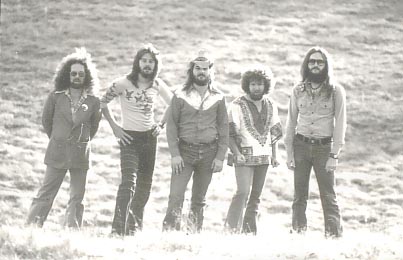 One particular day, as we discussed the current situation, Jimmy received a phone call from Dennis. JJ had just asked me if I had ever thought about playing in a band with Dennis again. Of course, I'd have wanted that very much. When JJ put me on the phone, Dennis told me that he didn't feel that his band, Cross, was going to make it and asked if I would start one with him. I agreed but said that it would be easier if he just joined my group at the club because we had a steady gig, besides we were "living in Muscle Shoals". Dennis joined my band. That group contained all of the original members of Jackson Highway plus one guy, an organist, Gerald Morrison, that quit shortly there after. The five remaining members were together almost 13 years.
One particular day, as we discussed the current situation, Jimmy received a phone call from Dennis. JJ had just asked me if I had ever thought about playing in a band with Dennis again. Of course, I'd have wanted that very much. When JJ put me on the phone, Dennis told me that he didn't feel that his band, Cross, was going to make it and asked if I would start one with him. I agreed but said that it would be easier if he just joined my group at the club because we had a steady gig, besides we were "living in Muscle Shoals". Dennis joined my band. That group contained all of the original members of Jackson Highway plus one guy, an organist, Gerald Morrison, that quit shortly there after. The five remaining members were together almost 13 years.
One more interesting thing to me is the fact that just before Dennis' call; Johnson had been discussing band names with me. I didn't have anything particularly great and Jimmy asked "How about Jackson Highway?" With no hesitation I said yes, it was an honor to feel that he felt that strongly about my talent, strong enough to give me such a legendary namesake.
We put together a band that consisted of writers for MSS (Muscle Shoals Sound) with the objective of providing a means of supporting ourselves while we wrote songs. Also the band was to be able to "demo" the songs, a good "cheap" deal for MSS and a good way for us writers to get demos done quickly.
After a short time, I was in the office talking with JJ (Jimmy Johnson), as was a normal thing for me. He and I often would discuss direction, songwriting, and later after Highway was on the road ourselves, I often served as the contact between the band and JJ.

One more interesting thing to me is the fact that just before Dennis' call; Johnson had been discussing band names with me. I didn't have anything particularly great and Jimmy asked "How about Jackson Highway?" With no hesitation I said yes, it was an honor to feel that he felt that strongly about my talent, strong enough to give me such a legendary namesake.
What were the band influences?
Gosh we listened to a lot of stuff as a group. Dennis and I as kids were into the Beatles (like the rest of the world), Britt (guitarist) once said that he was influenced by horn bands, such as Blood Sweat and Tears, and Tommy (keyboards) listened to classical music. I really was always into the Sun Records artists, especially Jerry Lee Lewis, Charlie Rich, and Elvis.
I remember that Tommy and I were really turned on by Delbert and Glen, our first introduction to Delbert McClinton. Also Frank Zappa. Another band that pulled us all together was The Allman Brothers. They were 'southern rock' to us before Skynyrd. Today they still are the high water mark.
I remember that Tommy and I were really turned on by Delbert and Glen, our first introduction to Delbert McClinton. Also Frank Zappa. Another band that pulled us all together was The Allman Brothers. They were 'southern rock' to us before Skynyrd. Today they still are the high water mark.
As a lyricist I admired Bernie Tarpin but also really like Delbert's style of writing.
Most of this was before I went to "school in shoals", once I was there, the first session I really got to watch start to finish was the "Prone to Lean" sessions on Donnie Fritts, produced by Jerry Wexler and Kris Kristofferson at the old' 3614 studio. Donnie became an immediate influence and introduced me more directly to the writing of Hinton, Fritts, Tony Joe White, etc. That's when Tommy and I both began to really think in terms of the style of early Muscle Shoals writers. Many of their "hits" I was familiar with but their whole body of work began to have more meaning for me.
I remember that Tommy and I were really turned on by Delbert and Glen, our first introduction to Delbert McClinton. Also Frank Zappa. Another band that pulled us all together was The Allman Brothers. They were 'southern rock' to us before Skynyrd. Today they still are the high water mark.
I remember that Tommy and I were really turned on by Delbert and Glen, our first introduction to Delbert McClinton. Also Frank Zappa. Another band that pulled us all together was The Allman Brothers. They were 'southern rock' to us before Skynyrd. Today they still are the high water mark.
As a lyricist I admired Bernie Tarpin but also really like Delbert's style of writing.
Most of this was before I went to "school in shoals", once I was there, the first session I really got to watch start to finish was the "Prone to Lean" sessions on Donnie Fritts, produced by Jerry Wexler and Kris Kristofferson at the old' 3614 studio. Donnie became an immediate influence and introduced me more directly to the writing of Hinton, Fritts, Tony Joe White, etc. That's when Tommy and I both began to really think in terms of the style of early Muscle Shoals writers. Many of their "hits" I was familiar with but their whole body of work began to have more meaning for me.
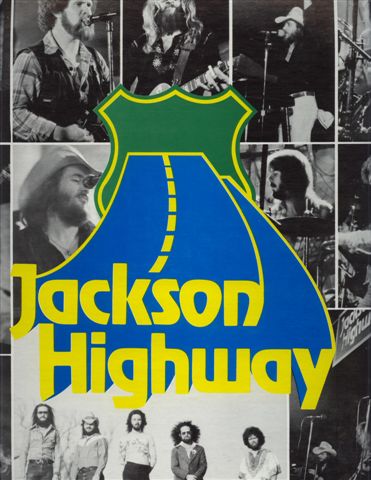
In 1977, you released a first LP ("Jackson Highway") on MSS records, produced by Jimmy Johnson and David Hood. It was recorded in various sessions from 1975 to 1977. Why such a so long period?
All of the first record was made of demos of songs we were writing for the publishing company. The material really didn't fit the artists that were recording there; the songs were really perhaps more "our" material, with no commercial style. We certainly weren't Skynyrd, or Blackfoot, or Percy Sledge.
Eventually as we became a "band" instead of a group of songwriters, we needed a recording to help us get jobs, so the "demos" were grouped together and released as our first LP.
Eventually as we became a "band" instead of a group of songwriters, we needed a recording to help us get jobs, so the "demos" were grouped together and released as our first LP.
How could you define the musical style of this first LP?
It was very eclectic, there's some Country ala Delbert and Glen, even a cover of their version of William Bell's "Everyday Will Be A Holiday", to a rocker, such as "Hook line and Sinker" influenced by watching Ricky Medlocke and Blackfoot in action.
Perhaps it was too eclectic to catch the ear of a record label, so we put it out ourselves.
Perhaps it was too eclectic to catch the ear of a record label, so we put it out ourselves.
Did you play the same stuff (as on the disc) on stage? What were the set lists?
Yeah we played most all of the disc live. We very much were always a very live band.
We played a lot of clubs and in the 70's in the Southeast, a band still had to play a lot of "cover" stuff so we covered everything from ACDC, Areosmith, the Allman Brothers to Parliament Funkadelic, right along with Jerry Lee Lewis.
Yeah very eclectic before I even knew that word was in the dictionary.
We played a lot of clubs and in the 70's in the Southeast, a band still had to play a lot of "cover" stuff so we covered everything from ACDC, Areosmith, the Allman Brothers to Parliament Funkadelic, right along with Jerry Lee Lewis.
Yeah very eclectic before I even knew that word was in the dictionary.
Did the band play many shows?
For thirteen years we played 4 to 5 days a week somewhere, Clubs, Frats, opening for acts like Blackfoot, even B.J. Thomas, and once Iron Butterfly. We'd be on the road for 6 to 8 weeks at a time.
The second record was in 1980 ("Jackson Highway" on Capitol). What did you do between the two discs?
We worked on the road. As the "manager", my agreement with JJ was to keep the band together till he could get us a deal. As a band we lived for that day, hoping that a major label would put us where we dreamed of being, a successful rock act with all the trimmings.
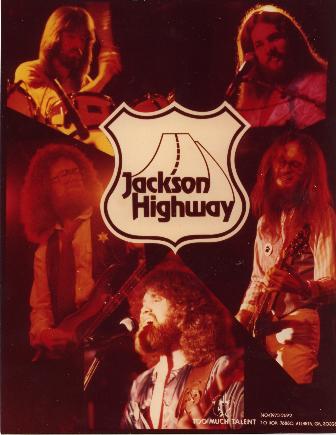
How did you get a contract with Capitol?
Jimmy kept pitching us whenever he could get anyone to listen. With "new wave" and skinny ties in vogue, a long haired "southern rock band" was not what most were looking for. I think that we came on at the end of an era, Skynyrd's plane had crashed, and many were thinking that Jackson Highway was another Skynyrd. We never saw ourselves as such. Either way, along with a label deal for the MSS studios, Jackson Highway was signed to do the debut LP for the MSS/Capitol label [Editor's note: thus, the second]. Delbert, Russell Smith, Lenny LeBlanc, Frankie Miller, and Levon Helm, all did records under that agreement.
Was Lynyrd Skynyrd an influence for the band?
We first heard of Skynyrd when Jimmy Johnson was giving us our first tour of MSS at 3614. He played the recordings that he'd done of the band. We thought of them as really good but we were trying to do our "own thing" so, at first I didn't feel particularly strong about them. Not the way I felt about the Allman Brothers.
Later after I met the band (and they even sat in with us at our club gig), I began to listen more to Ronnie's songwriting, that's when I really began to appreciate them. By that time a band could not play in Southern clubs unless they were playing some Skynyrd songs.
More than being influenced, I guess I was a bit envious of them. They had what I wanted... a major label deal.
More than being influenced, I guess I was a bit envious of them. They had what I wanted... a major label deal.
Your style was not very far from some Capricorn recordings? Before their bankrupt, didn't you have contacts with them ?
My brother Dennis had more contact with them early on. By the time we were in Shoals, all of the pitching of our material was done by Jimmy Johnson. In fact when we released our first LP on the MSS label, Johnson asked that if anyone seemed interested in us, to direct them to him, as our manager. Capricorn knew who we were through their relationship with Johnson more than any direct contact with us.
Wet Willie was from Alabama. Where they an influence for you? Were you in touch with them?
We were aware of Wet Willie from their earliest days (Dripping Wet LP). They played the same circuit with Cross (Dennis' Band) but we didn't hang together.
I have met various members in more recent years and played in the Beat Daddys with Lewis the drummer.
I would be more likely to be influenced by Jimmy Hall now. He's such a great singer. His "Rendezvous with the Blues" is such a great record. The sound he had on that record's acoustic tracks was exactly what I was hoping to get on my "Back to the Swamp" CD. In fact, Jack Pearson was the guitarist I wanted to hire for my sessions because of his work on Jimmy's record.
I have met various members in more recent years and played in the Beat Daddys with Lewis the drummer.
I would be more likely to be influenced by Jimmy Hall now. He's such a great singer. His "Rendezvous with the Blues" is such a great record. The sound he had on that record's acoustic tracks was exactly what I was hoping to get on my "Back to the Swamp" CD. In fact, Jack Pearson was the guitarist I wanted to hire for my sessions because of his work on Jimmy's record.
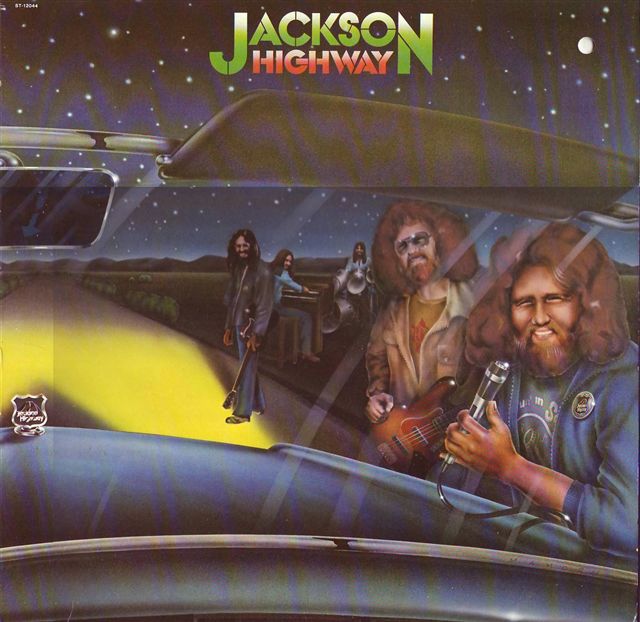
Like on the first disc, musicians are the same. Does it mean the band was very united?
Yeah we were certainly brothers by then. We'd been through a lot of hell together and had lived constantly on the road, sharing one little van, motel rooms with no one else for 7 years at that point. We all wanted that Brass Ring.
We were poor, never had made any money, and had no safety net except each other. We shared everything we had which was nothing except that dream.
We were poor, never had made any money, and had no safety net except each other. We shared everything we had which was nothing except that dream.
This LP, still produced by Johnson and Hood, sounds more rock than the MSS. Does it reflect an evolution of the band or is it only a question of production?
The production certainly was a big part of that but as a band we definitely had grown. We had gone in 7 years from a group of songwriters with no direction to band of hungry musicians that were working all the time on the road. We saw the competition and were paying the price to be there in determination and perseverance. We saw what a record could do for an act too by releasing the first LP ourselves and working every aspect from promotion to booking dates. We had little help. Weren't many that believed in us but JJ did, and a large cult in the Southeast.
Could you tell us about the legendary producers Jimmy Johnson and David Hood: What weres their work?
They were great to work with. There was never any pressure and they taught us how to record, the same way they had worked with Skynyrd before. They believed in bands and felt that if we could learn to produce ourselves, then we could learn to survive. The dream was to be the whole package... songwriters, producers, and players... like the Beatles.
Jimmy very rarely tried to tell us what to be or what to write. We'd select the songs we wanted to do, then after we recorded the songs, we'd see which ones survived. They were willing to let us try our ideas without shooting them down. Very open minded.
That could answer why it took so long to get a deal or to get a volume together, but they wanted it to be real... wanted it to be us.
Johnson was a great teacher, he'd go in his office while David would record the first passes with us. Then when we thought we were ready, David would call Jimmy in. With fresh ears he'd listen to our work and give us a yea or nea. He'd never be negative always positive and they both were listeners, musicians that worked with us.
Jimmy very rarely tried to tell us what to be or what to write. We'd select the songs we wanted to do, then after we recorded the songs, we'd see which ones survived. They were willing to let us try our ideas without shooting them down. Very open minded.
That could answer why it took so long to get a deal or to get a volume together, but they wanted it to be real... wanted it to be us.
Johnson was a great teacher, he'd go in his office while David would record the first passes with us. Then when we thought we were ready, David would call Jimmy in. With fresh ears he'd listen to our work and give us a yea or nea. He'd never be negative always positive and they both were listeners, musicians that worked with us.
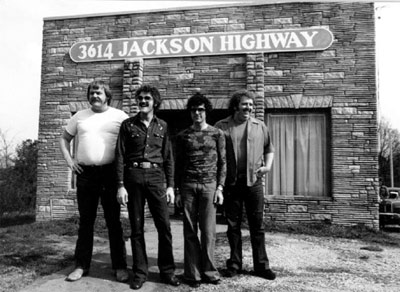
How were the recording sessions?
The recording sessions were real learning experiences at first and also in the legendary studio at 3614 Jackson Highway. We would run the songs down while usually David listened and helped with EQ and getting the right instrument sounds, although sometimes it was Jimmy there first. After a take or two, the other producer would come in with fresh ears and see how the recording sounded to him and give some thoughts and/or directions. Then we'd proceed to record till we all felt the track was really to put aside and to go on to another song.
We usually worked on two or three songs at a time, except while doing the Capitol/MSS record. That record was recorded with two weeks spent recording the basic tracks (all songs were already chosen, and Jimmy let us, the writers, choose the songs to be recorded), then two weeks to record over dubs (mostly guitar parts), then two weeks for vocals and background vocals, and then finally after a week to ten days off to allow our ears to rest, Dennis, David, and Jimmy mixed the sessions. That was a real recording lesson for Dennis and the skills developed during that experience still affect his recording techniques today.
The second LP was recorded at the 1000 Alabama Ave. facility, the new or "second" Muscle Shoals Sound, a state of the art studio down on the Tennessee River.
We usually worked on two or three songs at a time, except while doing the Capitol/MSS record. That record was recorded with two weeks spent recording the basic tracks (all songs were already chosen, and Jimmy let us, the writers, choose the songs to be recorded), then two weeks to record over dubs (mostly guitar parts), then two weeks for vocals and background vocals, and then finally after a week to ten days off to allow our ears to rest, Dennis, David, and Jimmy mixed the sessions. That was a real recording lesson for Dennis and the skills developed during that experience still affect his recording techniques today.
The second LP was recorded at the 1000 Alabama Ave. facility, the new or "second" Muscle Shoals Sound, a state of the art studio down on the Tennessee River.
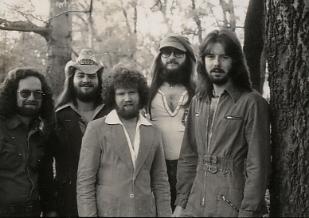
You covered here two of your songs from the first album. Why?
The first record was an independent release that probably never got the promotion that it deserved to have had a chance for success due to limited finances and knowledge on my part. There were two songs, "Circles" a personal favorite of Jimmy Johnson's, and "Hook, Line, and Sinker", a strong song that went over well live, that we wanted to rerecord for Capitol/MSS.
Blackfoot musicians appear on "Rock And Roll Man". how did it occurr?
The guys were on the road and passing through Muscle Shoals and just happened to stop by the studio while we were recording "Rock and Roll Man" a song written by George Jackson, writer of "Old' Time Rock and Roll" recorded by Bob Seger. They certainly know how to rock and were generous to agree to play on that track.
By the way, the original version of "Old' Time Rock and Roll" that was sent to Seger was done with Dennis singing and Britt playing guitar. Jimmy offered the song to us for our first record but it was already at the pressing plant. Dennis suggested the song be sent to Seger. Seger's final record still had guitar parts by Britt. We wanted to record a George Jackson song (he's a legend in his own right) and "Rock and Roll Man" was a great addition on our record, especially with Blackfoot.
By the way, the original version of "Old' Time Rock and Roll" that was sent to Seger was done with Dennis singing and Britt playing guitar. Jimmy offered the song to us for our first record but it was already at the pressing plant. Dennis suggested the song be sent to Seger. Seger's final record still had guitar parts by Britt. We wanted to record a George Jackson song (he's a legend in his own right) and "Rock and Roll Man" was a great addition on our record, especially with Blackfoot.
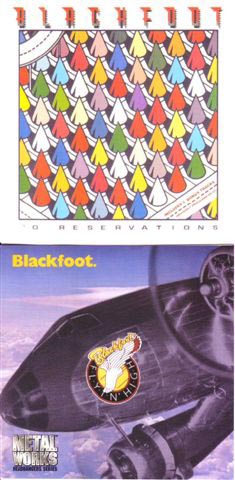
The two first Blackfoot's LPs were recorded at Muscle Shoals. Were you at these sessions?
Yes, I was in fact rather envious of "foot" because I thought they were causing Jackson Highway to be put on "the back burner". In fact JH was just not ready yet.
Jakson Spires really awed us all. They had to nail his bass drum to the floor to keep it still to record and in the basement of 3614 is where the artist lounge was located. It was serious "thunder" down there during the sessions.
The whole band was sooooo tight, as one reviewer/writer stated, almost too tight. Just one Rock Machine. The guitars were amazing too. Ricky, of course, was a Rock Star waiting to happen.
The "foot" became very supportive of JH and later when we signed with Capitol, Medlocke pitched us to their booking agent for our first national tour with Ted Nugent, UFO, and Triumph.
Jakson Spires really awed us all. They had to nail his bass drum to the floor to keep it still to record and in the basement of 3614 is where the artist lounge was located. It was serious "thunder" down there during the sessions.
The whole band was sooooo tight, as one reviewer/writer stated, almost too tight. Just one Rock Machine. The guitars were amazing too. Ricky, of course, was a Rock Star waiting to happen.
The "foot" became very supportive of JH and later when we signed with Capitol, Medlocke pitched us to their booking agent for our first national tour with Ted Nugent, UFO, and Triumph.
Didn't this relations permit, before or after the Capitol contract, to introduce you with Atco records?
No, Southern Rock was having a hard time by the 1980's and although Blackfoot was busy, Al Nalli (their manager) was working very hard to keep them working. Although he talked very supportive of Jackson Highway, one of my last conversations with him after we moved to Nashville lead to him confiding that Ricky may have been looking a solo opportunities and Nalli was even considering looking at Nashville as an outlet for him.
Did you take something of this experience with Blackfoot for Jackson Highway?
Well yeah in some ways but Blackfoot and Jackson Highway were definitely two different breeds. Dennis and I are not guitar players like Ricky is and so the songs we write are not so guitar driven. They are vocal and lyric driven.
"Business" experiences differ from one artist to the next. Jimmy Johnson always told me not to measure my success or failures by the achievements of other artists, and I haven't. What worked for Skynyrd or Blackfoot, would not necessarily work for me and so if I'm to be valid I have to chart a course for myself, live by my standards regardless of wheither I ever get recognition or not.
Although I appreciate Ricky Medlocke's talent very much and even more any kind of things he's ever done for me, I know that in the end, as for any artist, it all boils down to my talent, my determination and dedication, and the way that I play the hand of cards that life deals me.
"Business" experiences differ from one artist to the next. Jimmy Johnson always told me not to measure my success or failures by the achievements of other artists, and I haven't. What worked for Skynyrd or Blackfoot, would not necessarily work for me and so if I'm to be valid I have to chart a course for myself, live by my standards regardless of wheither I ever get recognition or not.
Although I appreciate Ricky Medlocke's talent very much and even more any kind of things he's ever done for me, I know that in the end, as for any artist, it all boils down to my talent, my determination and dedication, and the way that I play the hand of cards that life deals me.
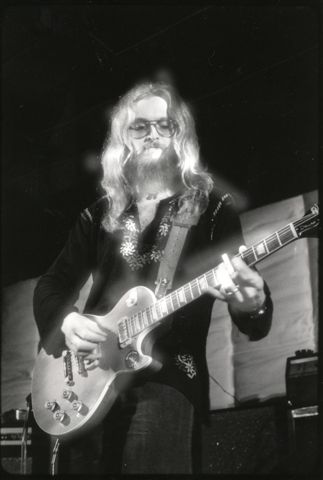
The main part of the stuff of the two discs are from the band and, especially, from you Russell. Could you tell us about the songwriting?
The reason I was asked to move to Shoals was because of my songwriting. Johnson saw something there that he felt was, I guess talent. I'd written songs since I was a young kid and growing up in the sixties, I knew that the success of the Beatles had ushered in an era where recording artists were expected to be writers, different from the 50's when Elvis, etc. recorded other people's songs. I also was under the impression that that was where the money was. I'd grown up poor so money or the hope of making it was important to me.
I usually started the process with a lyric idea or even a complete lyric, often while serving as the band's manager, I didn't have the time to actually sit down and "write" so I'd compose lyrics in my head while driving or traveling, pass them on to Dennis or Tommy and they do the music. Often, I'd not hear the final product till the band would rehearse the song to play live. We always played the songs live before going to the studio with them.
Today, I enjoy the act of writing with collaborators such as Johnny Neel, and my favorite collaborators are still Dennis, and my lifelong friend, Collins Kirby. I also write a lot by myself, mainly because I'd gotten tired of having a catalog of songs that I couldn't perform solo, so I write more music these days. A lot of "Back to the Swamp" was written solo but often Dennis will make suggestions and we are writing more together again.
I usually started the process with a lyric idea or even a complete lyric, often while serving as the band's manager, I didn't have the time to actually sit down and "write" so I'd compose lyrics in my head while driving or traveling, pass them on to Dennis or Tommy and they do the music. Often, I'd not hear the final product till the band would rehearse the song to play live. We always played the songs live before going to the studio with them.
Today, I enjoy the act of writing with collaborators such as Johnny Neel, and my favorite collaborators are still Dennis, and my lifelong friend, Collins Kirby. I also write a lot by myself, mainly because I'd gotten tired of having a catalog of songs that I couldn't perform solo, so I write more music these days. A lot of "Back to the Swamp" was written solo but often Dennis will make suggestions and we are writing more together again.
Was the LP a commercial success?
No, there were lots of reasons I think accounted for that, but the two that I think were significant were first a new era in popular music was emerging with "new wave" and Skynyrd's plane had crashed in Louisiana. They were the most successful and significant torch bearers for "southern" rock at the time. That marked an end of an era. Second, The Capitol/MSS deal was new and both companies had not worked together long enough to develop a good promotional strategies. That company was not strong enough to really break an unknown act such as "Highway". Most touring acts that seemed to be breaking had two to three LPs before they saw success, our deal was over before the second LP could get out.
Is there somewhere some unreleased tracks?
Yes, there are at least one to two more CDs in the can. Some are just in the "demo" stage but some are certainly "good" enough for release, especially the material we record in preparation for the second Capitol/MSS release. That material was mostly written in response to being on the road with such hard kicking bands as Ted Nugent. We knew if we were going to open for such, we had to go out burning, so the material was written with live performance and energy in mind.
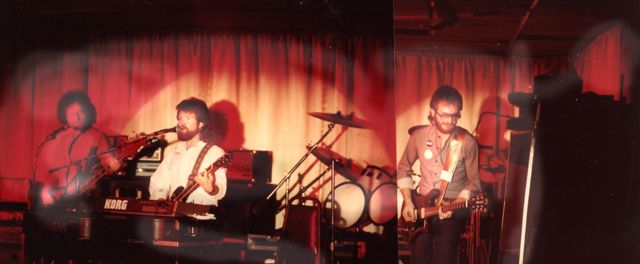
It seems to me that the LP wasn't released on CD. Is there a project?
No it has not been released as a CD. There is some talk about a compilation CD to be released next year (2007), the 30th anniversary of the release of the first LP.
With which bands did you share the stage?
We worked stages with Ted Nugent, UFO, Triumph, Blackfoot, Mother's Finest, Alabama, B.J.Thomas, Nantucket, Wet Willie, oh gosh... many others as individuals.
What are your memories of the road life?
There are so many but they mostly evolve around the band members. Like I said before we were often so broke that we'd have to really band together to just survive and it was a common dream that kept us going against all odds.
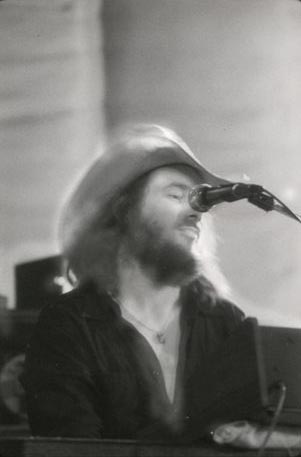
What was the life of Jackson Highway after this second disc? When, how and why did the band split?
After the second LP was out and then considered "dead" by the record label, we were set for an "audition" of the new material for the record label. The week of the audition, Dennis' and my dad passed away. We missed the audition and some of the band members chose to move back to their homes.
Dennis and I were put on retainer by MSS as writers, to write for a new record deal. Before we had that opportunity to materialize, Barry Beckett moved to Nashville as a producer and MSS was sold to Malaco. Our retainer was removed so Dennis and I chose to move to Nashville. Teddy Gentry of Alabama had suggested that we do so. We were in debt and had the best chance of getting work as musicians there.
Very shortly after moving to Nashville, Ronnie Vance and Britt Meacham rejoined us to form a 4 member Jackson Highway. That unit of all original members worked Las Vegas, the Midwest, and the Nashville club scene. At the suggestion of Barry Beckett, then at Warner Brothers, we planned to stay close to the industry and Beckett to work toward another deal. That would mean staying off the road to be accessible to the label. Jimmy Johnson produced another "demo" session for us to pitch to Beckett and Warner Brothers. (All five members of Jackson Highway played on the sessions). When the band realized that we were going to have to start at the bottom again to gain favor with a new label, a couple of the members chose to leave the band. Dennis and I decided that we would work on our own rather than invest emotionally in another group effort.
Dennis and I were put on retainer by MSS as writers, to write for a new record deal. Before we had that opportunity to materialize, Barry Beckett moved to Nashville as a producer and MSS was sold to Malaco. Our retainer was removed so Dennis and I chose to move to Nashville. Teddy Gentry of Alabama had suggested that we do so. We were in debt and had the best chance of getting work as musicians there.
Very shortly after moving to Nashville, Ronnie Vance and Britt Meacham rejoined us to form a 4 member Jackson Highway. That unit of all original members worked Las Vegas, the Midwest, and the Nashville club scene. At the suggestion of Barry Beckett, then at Warner Brothers, we planned to stay close to the industry and Beckett to work toward another deal. That would mean staying off the road to be accessible to the label. Jimmy Johnson produced another "demo" session for us to pitch to Beckett and Warner Brothers. (All five members of Jackson Highway played on the sessions). When the band realized that we were going to have to start at the bottom again to gain favor with a new label, a couple of the members chose to leave the band. Dennis and I decided that we would work on our own rather than invest emotionally in another group effort.
Are you still in relations with the other members? What are they becoming?
Yes, we still remain friends. I think that at first, after the breakup, as in most relationships, we each had to find ourselves and begin to chart a course that fit the individual.
I began to work as a sideman again, as I'd done a various other times in my career. That time I worked for Margo Smith, a country star of the 70's with numerous "hit" to her credit and one that was stable and worked a lot. I'd gotten married and after the birth of my daughter, Amanda, I returned to Fort Payne to continue my "soul searching". Wound up involved in the regional arts community as a arts programming producer, folk life researcher, arts in education teaching artist, and public arts administrator.
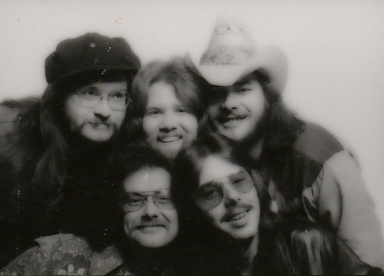 I'd still perform locally whenever I could and moved toward developing as a solo artist and songwriter. Dennis and I continued to write together and as he stayed in Nashville on the scene, he became my connection that kept me in contact with the industry. We wrote songs for Mike O'Rear's Publishing, the man who was managing the MSS Publishing Company when we first moved to Muscle Shoals.
I'd still perform locally whenever I could and moved toward developing as a solo artist and songwriter. Dennis and I continued to write together and as he stayed in Nashville on the scene, he became my connection that kept me in contact with the industry. We wrote songs for Mike O'Rear's Publishing, the man who was managing the MSS Publishing Company when we first moved to Muscle Shoals.
Dennis stayed in the club scene in Nashville and began to earn a solid reputation around town. He was successful for a while as a vocalist in commercials and became the band leader at one of the longest running successful Nashville night clubs, The Starlite. There he was in constant contact with the hottest players coming in and out of town looking for work as side men or as artists.
Britt went back to Mobile and began to work the club scene there. Britt later toured the US and Japan with "Little" Milton Campbell before joining his current band, Malaco recording act, The Beat Daddys. Britt has been with them for some time now. In fact, when I decided to work again, I played bass for the group for a couple of years. I wrote one song, "Miss Dixie" for their CD, "Delta Vision". It was while I was with them that I started working on my own demos.
Tommy Patterson has remained in Muscle Shoals working as a session player and also working the club scene there. He's also gotten heavily involved in computers, was one of the first thereto get into programming tracks for publishing demos. He's tour with several acts, including the legendary "Little" Richard. With his skills as a harp player, he's played on recordings by Sawyer Brown, Jimmy Buffett, and on my CD, "Back to the Swamp". Tommy has played several club and festival dates with me the last couple of years.
Ronnie Vance still lives in Shoals; he was the only one originally from there. He has worked in the club scene for many years and now is a successful businessman. I have seen him off and on whenever I might be in town. He and Tommy have worked together in club bands there in Shoals.
I began to work as a sideman again, as I'd done a various other times in my career. That time I worked for Margo Smith, a country star of the 70's with numerous "hit" to her credit and one that was stable and worked a lot. I'd gotten married and after the birth of my daughter, Amanda, I returned to Fort Payne to continue my "soul searching". Wound up involved in the regional arts community as a arts programming producer, folk life researcher, arts in education teaching artist, and public arts administrator.

Dennis stayed in the club scene in Nashville and began to earn a solid reputation around town. He was successful for a while as a vocalist in commercials and became the band leader at one of the longest running successful Nashville night clubs, The Starlite. There he was in constant contact with the hottest players coming in and out of town looking for work as side men or as artists.
Britt went back to Mobile and began to work the club scene there. Britt later toured the US and Japan with "Little" Milton Campbell before joining his current band, Malaco recording act, The Beat Daddys. Britt has been with them for some time now. In fact, when I decided to work again, I played bass for the group for a couple of years. I wrote one song, "Miss Dixie" for their CD, "Delta Vision". It was while I was with them that I started working on my own demos.
Tommy Patterson has remained in Muscle Shoals working as a session player and also working the club scene there. He's also gotten heavily involved in computers, was one of the first thereto get into programming tracks for publishing demos. He's tour with several acts, including the legendary "Little" Richard. With his skills as a harp player, he's played on recordings by Sawyer Brown, Jimmy Buffett, and on my CD, "Back to the Swamp". Tommy has played several club and festival dates with me the last couple of years.
Ronnie Vance still lives in Shoals; he was the only one originally from there. He has worked in the club scene for many years and now is a successful businessman. I have seen him off and on whenever I might be in town. He and Tommy have worked together in club bands there in Shoals.
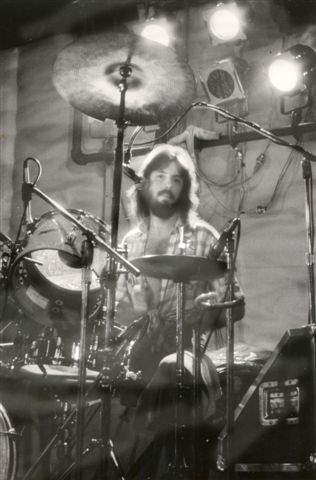
In an interview for French magazine Blues & Co (#34, December 2005), you seemed bitter about this experience and the end of the band. Why?
I didn't intend to seem bitter. I'd invested my life emotionally in that effort and it really hurt when I realized that after all we'd gone through, some of us were not willing to continue. Barry Beckett was still willing to work with us, a legend in his own right, and connected well enough, that we stood a good chance of getting another deal. It would take perseverance, dedication, and hard work, but look what Blackfoot went through before they broke... three record labels, or Delbert McClinton.
I literally had nothing to fall back on. I was hungry for success and would have worked the rest of my life for it. With Jackson Highway over, I had to rebuild my own confidence and learn to survive at the only thing I really know how to do... music. Along the way, I've supported a family by working minimal jobs, often two at a time, and by gigging when I could.
I'm not the only one that has had to learn how to survive. As a folklorist, I've studied a lot of artists that have worked hard and continue to be a tradition bearer without the financial benefits that a "big hit" often brings. These artists are the ones that really matter when it means that tradition and culture are carried on to the next generation. Artists that are successful in the popular world, often find themselves too having to survive the record making machines of our pop culture and to build a life after.
I really admire such artists that are here for the long haul, they are true artists, and I'd be honored to be considered among them. I'm here for the long haul... because this is what I am.
I literally had nothing to fall back on. I was hungry for success and would have worked the rest of my life for it. With Jackson Highway over, I had to rebuild my own confidence and learn to survive at the only thing I really know how to do... music. Along the way, I've supported a family by working minimal jobs, often two at a time, and by gigging when I could.
I'm not the only one that has had to learn how to survive. As a folklorist, I've studied a lot of artists that have worked hard and continue to be a tradition bearer without the financial benefits that a "big hit" often brings. These artists are the ones that really matter when it means that tradition and culture are carried on to the next generation. Artists that are successful in the popular world, often find themselves too having to survive the record making machines of our pop culture and to build a life after.
I really admire such artists that are here for the long haul, they are true artists, and I'd be honored to be considered among them. I'm here for the long haul... because this is what I am.
What did you do after?
I keep working, writing, playing gigs, recording... being a musician/artist. I may have to do other things too to pay the bills but whatever it takes, I'll be here as long as God allows me to have health.
I'll be hopefully recording again soon for a fall 06 release, have plans for some sort of Jackson Highway commemorative release in 07, plan to be involved in the arts community locally and regionally in several ways, will continue my folk life studies, ... I'll be a very busy man, but not too busy to tour France if the opportunity ever arises.
I'll be hopefully recording again soon for a fall 06 release, have plans for some sort of Jackson Highway commemorative release in 07, plan to be involved in the arts community locally and regionally in several ways, will continue my folk life studies, ... I'll be a very busy man, but not too busy to tour France if the opportunity ever arises.

How did you meet Johnny Neel?
I have a brother named Randy that often traveled with Jackson Highway as a stage manager and sound engineer. Through the years, Randy has worked with a lot of acts and as the engineer at a club in Nashville; he met Johnny and began to assist him in the installation of his recording studio, Straight Up Sound.
Randy introduced Dennis to Johnny and Dennis then started to work with Johnny as his studio manager and engineer. [Editor's note: look at the credits of the recent Neil Carswell's disc!]
As I said earlier, Dennis and I have continued to always write together, so we booked Johnny and the studio to do some demos. It was those sessions that I first met Johnny for myself. He seemed to like my writing and thought it'd be nice to write together.
Randy introduced Dennis to Johnny and Dennis then started to work with Johnny as his studio manager and engineer. [Editor's note: look at the credits of the recent Neil Carswell's disc!]
As I said earlier, Dennis and I have continued to always write together, so we booked Johnny and the studio to do some demos. It was those sessions that I first met Johnny for myself. He seemed to like my writing and thought it'd be nice to write together.
He recorded one of your songs ; you played together. Is it a close collaboration?
Johnny has been known to say that the Gulley brothers are like family with him and we feel the same way. Ever since Dennis started working with him, also Randy, I was always able to go around the studio and lend whatever talents I have to the current project.
I really enjoy being around Johnny and am honored that whenever I have gig that is suitable for him to work with me, he will. The same goes for Doug Jones, and Chris Anderson, of the Outlaws and Blackhawk. I'm honored to have them on stage with me at anytime. They seem to enjoy it as well. They are my A team and if there's any date of any significance, I call them first. They are busy and sometimes are already committed to other gigs, but if available, they always are willing to cover me.
One of the most flattering things I think anyone has ever said about me is that once in an interview, Johnny referred to me as "the real thing". He listens to my CD a lot and says the same thing, "it's a real record". If Johnny Neel can sense a genuine quality in me and my music, then I must be on to something. Neel and Anderson don't have to play with me, they certainly make more money with others, but they do play with me.
Is it a close collaboration? When some one as talented as Johnny Neel or Chris Anderson works with you, it's wise to listen to what they have to say. They are among the most talented guys around. They let me lead, but I always listen.
I really enjoy being around Johnny and am honored that whenever I have gig that is suitable for him to work with me, he will. The same goes for Doug Jones, and Chris Anderson, of the Outlaws and Blackhawk. I'm honored to have them on stage with me at anytime. They seem to enjoy it as well. They are my A team and if there's any date of any significance, I call them first. They are busy and sometimes are already committed to other gigs, but if available, they always are willing to cover me.
One of the most flattering things I think anyone has ever said about me is that once in an interview, Johnny referred to me as "the real thing". He listens to my CD a lot and says the same thing, "it's a real record". If Johnny Neel can sense a genuine quality in me and my music, then I must be on to something. Neel and Anderson don't have to play with me, they certainly make more money with others, but they do play with me.
Is it a close collaboration? When some one as talented as Johnny Neel or Chris Anderson works with you, it's wise to listen to what they have to say. They are among the most talented guys around. They let me lead, but I always listen.
You have released a first CD in 2004, "Back to the Swamp". Why only today?
As I started to want to work more as a performer, a recording became more important to secure bookings. At first that was the main goal, but after I left The Beat Daddys, I began to want to do something that my children could listen to and perhaps gain some understanding as to who their father is. I'd lost my father and feel that there is so much I would like to know about him, so I wanted to do a recording for my girls.
It's kind of amazing how much farther the CD seems to be going than I'd originally anticipated. I never expect it to be a "giant hit" but its reception has opened so many doors of opportunity for me to resume my active artist career.
It's kind of amazing how much farther the CD seems to be going than I'd originally anticipated. I never expect it to be a "giant hit" but its reception has opened so many doors of opportunity for me to resume my active artist career.
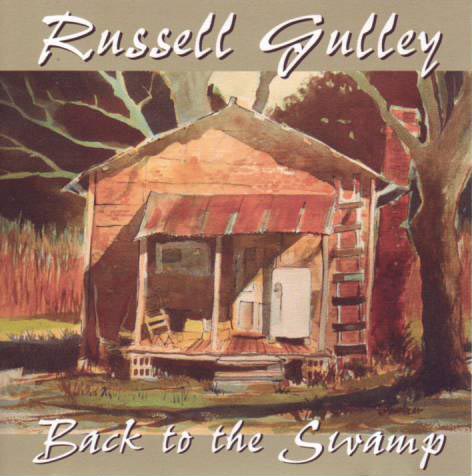
The style is acoustic blues with some others components like gospel. Could you tell us the reasons of this?
Well, I've listened to and performed a lot of music in my life. As a teen it was Gospel and Rock and Roll. As a young man returning from Vietnam, it was Soul music and "Rock". Through it all, the blues has always been at the roots of all the music I played. So I think that if I were to do an honest music, then all these influences would have to show through.
I chose to do it acoustically because I wanted to do it in a way that not only was roots oriented but in a fashion that would allow my voice to serve as "my" instrument. That's why I did the a capella song "Gospel According to the Blues". Not only would it lean heavily on my voice but would also in its lyrics tell a bit about where I'm from. On this record, among the musicians, we can see your brother Dennis, former Jackson Highway's keyboard player Tommy Patterson (on harmonica), Johnny Neel and Chris Anderson from the Outlaws. How does it occur that Chris plays with you?
I chose to do it acoustically because I wanted to do it in a way that not only was roots oriented but in a fashion that would allow my voice to serve as "my" instrument. That's why I did the a capella song "Gospel According to the Blues". Not only would it lean heavily on my voice but would also in its lyrics tell a bit about where I'm from. On this record, among the musicians, we can see your brother Dennis, former Jackson Highway's keyboard player Tommy Patterson (on harmonica), Johnny Neel and Chris Anderson from the Outlaws. How does it occur that Chris plays with you?
Johnny and Chris work together a lot and Dennis uses Chris a lot on sessions. When I first decided to do an acoustic record, I at first wanted to book Jack Pearson (Allman Brothers) to play resonator because I love the work he did on Jimmy Hall's CD "Rendezvous with the Blues". Johnny and Jack were to do the session live and we selected three songs to begin with. Jack was on call for an "A team" session and it came in one the same day as mine.
Dennis suggested Chris as a replacement. The session went so well that Chris played all the CD, I'm glad too; he really made the guitar parts "shine". Chris has since played several gigs for me and is a wonderful friend. He doesn't know how much I appreciate him.
Dennis suggested Chris as a replacement. The session went so well that Chris played all the CD, I'm glad too; he really made the guitar parts "shine". Chris has since played several gigs for me and is a wonderful friend. He doesn't know how much I appreciate him.
In Jackson Highway, you played bass and Dennis was the lead singer. Here, it's the opposite. Don't you play bass no more?
Yes, I play bass when I play clubs with an electric rhythm section and can't afford Dennis and my Nashville "A team". I've always loved bass but in reality, the rhythm section is usually better when Dennis plays because he works a lot more than I have in recent years and he can make the section really tight while I concentrate on the vocals.
It is quite different to now be the one out front. Again, I'm really fortunate that someone as talented as Dennis will work with me. Dennis is perhaps my biggest supporter. He's my producer, co-writer and partner. Beside that, he's a great brother.
It is quite different to now be the one out front. Again, I'm really fortunate that someone as talented as Dennis will work with me. Dennis is perhaps my biggest supporter. He's my producer, co-writer and partner. Beside that, he's a great brother.
In your projects, have you the idea of a Jackson Highway reunion?
I'd like to do some dates in 2007 as Jackson Highway, and I've started talking with the guys about that possibility. We'll just have to wait and see if that unfolds.
You have an electric CD, "Rockin' the Blues". When was it recorded and why is it not released? Could you describe a little about the disc?
The "Rockin' the Blues" project is the one that I started while touring as the bassist for The Beat Daddys. In fact a couple of the tracks, were originally to be Beat Daddy tracks, Britt is playing guitar and Larry Grisham is playing harp. Larry probably didn't think they sounded enough like the Beat Daddys, although the song "Miss Dixie" co-written with Larry was re-recorded for their "Delta Vision" release.
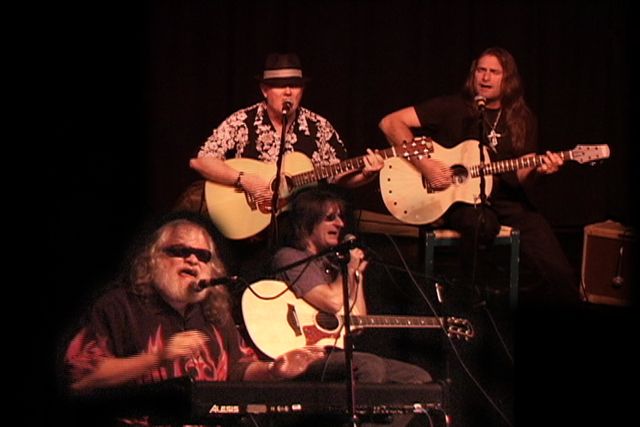 Britt plays on most of the guitar tracks, Dennis does bass, there are a couple of drummers, Neel is playing keyboards, etc. Dennis and I wrote the songs plus a friend," Collins Kirby" co-wrote some.
Britt plays on most of the guitar tracks, Dennis does bass, there are a couple of drummers, Neel is playing keyboards, etc. Dennis and I wrote the songs plus a friend," Collins Kirby" co-wrote some.
Like I said the Beat Daddys covered the song, "Miss Dixie" and the bluesman, Carl Weathersby, covered "Nothing Hurts a Man Like A Woman Can". So two of the songs are already on other artists records.
The reason it was not released was that I really felt inspired to do "Back to the Swamp". We may redo the tracks with some acoustic instruments added so that folks that have bought the "Swamp" CD may not be too alienated if we can keep the spirit of the original recordings. Otherwise, we may release it intact later. I'd kind of like to have my versions of the songs that were covered available too.
I'm writing all the time so I have a lot of material I want to record so that's why I'm wanting to do a new CD, Perhaps some of the "Rockin' the Blues" material could find service on a Jackson Highway release if we should decide to do new tracks too. Lots of possibilities.

Like I said the Beat Daddys covered the song, "Miss Dixie" and the bluesman, Carl Weathersby, covered "Nothing Hurts a Man Like A Woman Can". So two of the songs are already on other artists records.
The reason it was not released was that I really felt inspired to do "Back to the Swamp". We may redo the tracks with some acoustic instruments added so that folks that have bought the "Swamp" CD may not be too alienated if we can keep the spirit of the original recordings. Otherwise, we may release it intact later. I'd kind of like to have my versions of the songs that were covered available too.
I'm writing all the time so I have a lot of material I want to record so that's why I'm wanting to do a new CD, Perhaps some of the "Rockin' the Blues" material could find service on a Jackson Highway release if we should decide to do new tracks too. Lots of possibilities.
I would like to know your favorites Southern rock bands?
By far #1. Blackfoot the pure energy and power of their recorded and live performances. Rick's vocals still amaze. I play them a lot when I want a rush. No other band like them. God Rest Jakson.
#2. The Allman Brothers, they started it all.
#3. Drive By Truckers... The future is here.
#2. The Allman Brothers, they started it all.
#3. Drive By Truckers... The future is here.
Many thanks.
Thanks to you, Blues and Co., and anyone in France that helps us preserve this music. I appreciate all of your support and interest.


